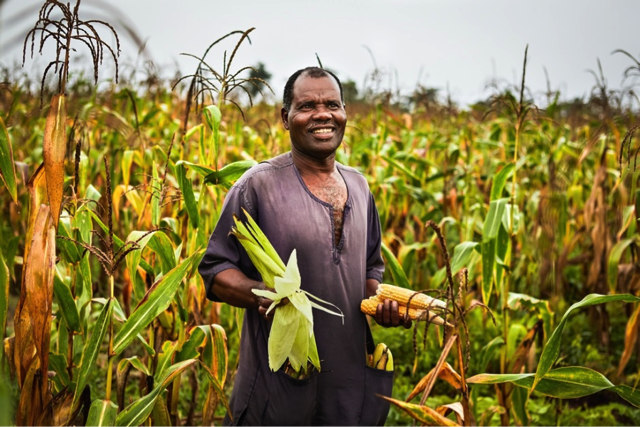Crops, grazing land, fisheries and livestock are already negatively affected by climatic changes and extremes. The recent El Niño, likely to be the strongest on record, has affected the food security of a vast number of people across the world. Among them, millions of smallholder farmers in developing countries, who own less than one hectare of land, live on less than US$1 per day and do not grow enough food to feed their families.
Across Africa, achieving food security for all will become increasingly difficult, and governments are under more pressure than ever to boost productivity and accelerate growth. However, the agricultural growth and food security goals set out by the African Union’s Malabo Declaration have underestimated the risk that climate change will pose to food and nutrition security, according to a new briefing paper by the Montpellier Panel. The paper, “Set for Success: Climate-Proofing the Malabo Declaration” argues that the Declaration, adopted in 2014 by African Union nations to double agricultural productivity and end hunger by 2025, is an important step in the right direction, but has failed to emphasise the risk for smallholder agriculture to climate change.

Credit: HarvestPlus
With mean temperatures across Africa expected to rise faster than the global average, possibly reaching as high as 3°C to 6°C greater than pre-industrial levels, the Montpellier Panel argues that climate-smart agriculture (CSA), which serves the triple purpose of increasing agricultural production, adapting to climate change and reducing greenhouse gas emissions, needs to be integrated into countries’ National Agriculture Investment Plans. The briefing paper concludes that CSA needs to become an explicit part of the Malabo Declaration’s implementation and recommends that strengthening Africa’s scientific capacity and providing better training for farmers on sustainable farming techniques will be essential to meeting these goals. A sustainable agriculture sector has the potential to contribute to food and nutrition security, build resilience, ensure sustained economic growth, and preserve our natural resource base. There are, however, many challenges to the uptake of effective CSA strategies, including limited financial resources, technical barriers and lack of skills and knowledge. These barriers can be overcome with stronger political leadership, coordination and effective partnerships between governments, the private sector, donors and research institutions.
Many innovative agricultural practices already take place across Africa, with the potential to increase smallholder farmers’ productivity while building their resilience and adaptive capacity. However, often they are small in scale and set up by an international or local NGO or funded by donors. There is an urgent need to identify these programmes and take them to scale. This can be achieved most effectively through partnerships between governments, the private sector and donor agencies, as no one actor can be successful without the impetus and support from the others.
The briefing paper highlights some of these success stories that are scalable or can be replicated in different contexts, and the effective partnerships that made them happen.
The West African Science Service Center on Climate Change and Adapted Land Use (WASCAL)
WASCAL is an example of a successful partnership between research institutions helping to “climate-proof” African agriculture. WASCAL is a research programme designed to enhance the resilience of agriculture systems and farmers to climate change, by identifying resilient and adaptive land use systems and developing strategies to conserve or restore ecosystems. WASCAL pools the expertise of ten West African countries and Germany and provides science-based advice to policymakers to climate change impacts, mitigation and adaptation measures. Through this partnership, scientists and early career researchers are able to benefit from each other’s expertise, local knowledge and technical know-how, enabling them to develop best possible strategies that are context-specific and based on latest scientific knowledge.
A “knowledge economy” that improves the scientific capacities of researchers and institutions, supported by financial incentives and better infrastructure will help provide smallholder farmers with the right advice and support to adapt to climate change and other weather extremes.
HarvestPlus and the Government of Zambia
In 2015, a vitamin A-rich, heat – and drought-tolerant, orange maize promoted by HarvestPlus survived the heat and poor rains in Zambia. Today, through a partnership with the Government, a campaign to replace white maize with the orange maize is expected to reach 500,000 farm households by 2020. The partnership between HarvestPlus and the Government of Zambia highlights how collaboration between governments – through good and effective leadership – and research institutions can lead to the formulation of evidence-based policy making for the benefit of rural communities and farmers.
Innovations such as crops biofortified with nutrients, drought-tolerant seeds and weather information systems are just some of the tools that will help build resilience and allow governments to deliver on the shared agenda of the Malabo Declaration, the Sustainable Development Goals and the Paris climate agreement.
Isiolo County Adaptation Fund (ICAF), Kenya
In 2012, the government of Kenya launched a new fund to help communities in northern Kenya adapt to climate change. In its first year the ICAF disbursed US$780,000 in Isiolo County. Livelihood and local resilience assessments identified the drivers that improved or undermined the ability of different groups to manage challenges such as climate variability, changing market conditions, disease or insecurity. Local communities also helped to identify solutions that would strengthen their adaptive capacities. The findings were used to prioritise investments to promote climate resilient growth and adaptive livelihoods. Through a partnership between the Government, the Kenyan Meteorological Department and a community radio station the climate information was also disseminated through a series of seasonal forecast workshops and broadcast county-wide in local languages, reaching a greater number of rural communities and allowing smallholder farmers make decisions on sowing times or when to harvest.
Insufficient finance and lack of reliable information remains one of the main constraints to implementing climate change adaptation and mitigation projects in Africa. Without significant investment in building their resilience, smallholder farmers and their families will not be able to adapt to climatic changes or undertake considerable mitigation actions. For Africa to gain significant access and tap into the resources of international climate funds, effective CSA programme design is required.
These success stories show just how crucial partnerships are to achieve optimum outcomes for the benefit of smallholder farmers. Programmes and strategies such as the ones discussed above allow smallholders increase their productivity and improve their livelihoods while weathering the challenges they face. Stakeholders will struggle to transform Africa’s agriculture sector alone. Partnerships coupled with effective government leadership, will be critical to success.
This article originally appeared in the June edition of the World Farmers’ Organisation “F@rmletter”



